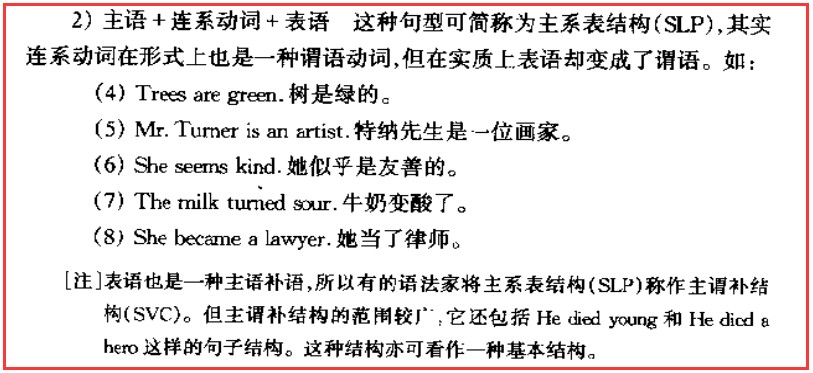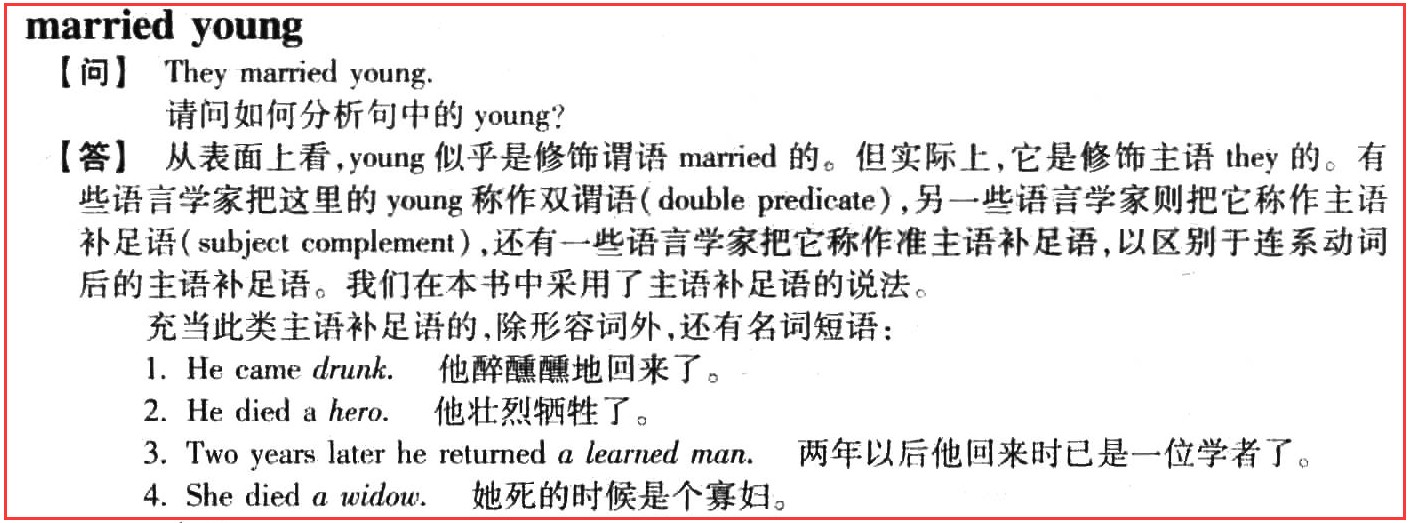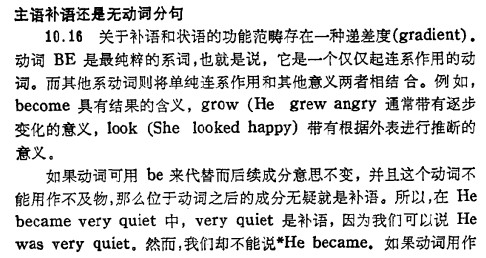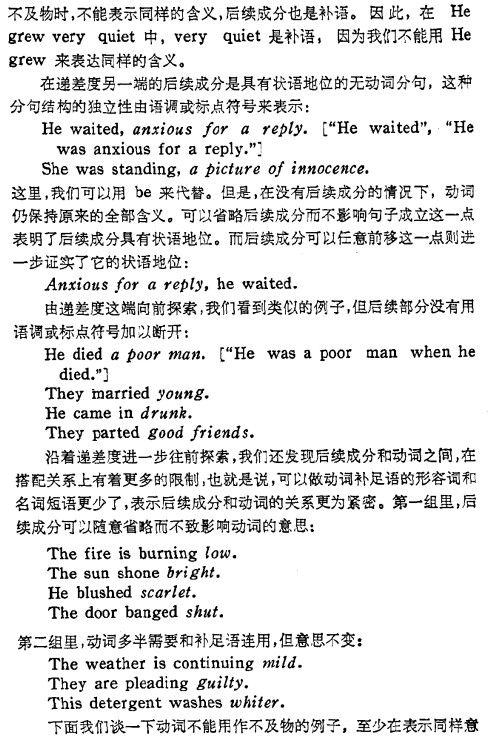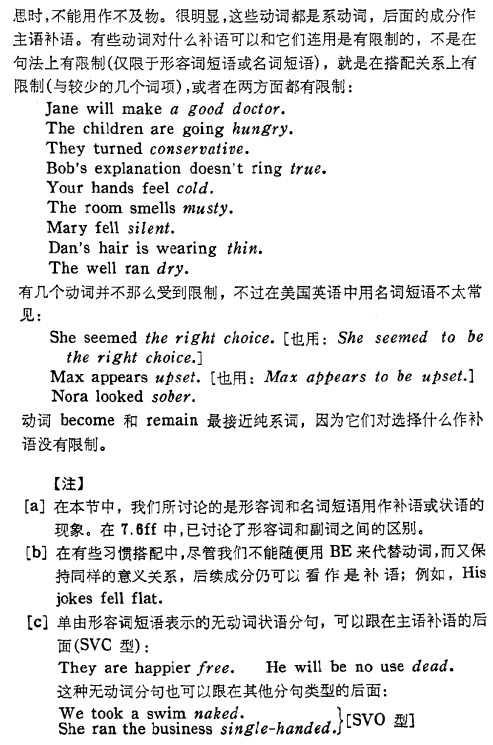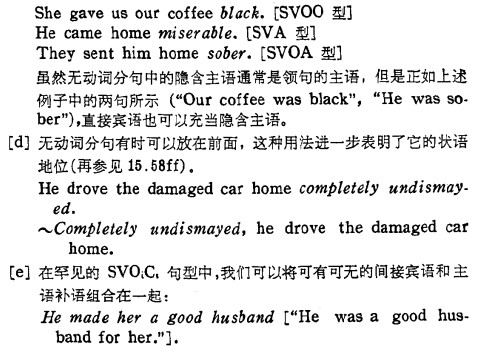5 marry young, die young, die a hero等的语法分析
在前面的一个解答中读到曹老师对 die a hero 的分析,很清晰,很受用。
https://www.cpsenglish.com/question/54955
但这个问题,我在不同资料上见过各种不同的分析方法,真不知道哪种方法是最正宗的。比较而言,感觉曹老师的分析最合情合理。
我在这里的想法是:有没有哪本比较权威的语法书对此有专门的、详细的的分析和归纳啊!
其它 6 个回答
网友可以仔细阅读夸克这段论述,然后你对系表结构和动状结构的划分就有较好的理解了。注意夸克所说的subject complement就是表语,verbless clause 就是无动词分句做状语(即名词词组或形容词词组做状语)。
Subject complement or verbless clause
10.16 There is a gradient relating the functional categories of complement and
adverbial. The copula at its purest, ie a verb having merely a linking function,
is the verb BE. Other copular verbs combine pure linking function with other
meanings. For example, become has a resultative meaning, grow (He grew
angry) usually adds a notion of gradual change, and look (She looked happy)
adds a notion of inference from appearance.
The element following the verb is clearly a complement if the verb can
acceptably be replaced by be with the final element retaining its sense and if
the verb cannot be intransitive. Thus very quiet in He became very quiet is a
complement because we can have He was very quiet and we cannot have *He
became. The final element is a complement also when the verb cannot be
intransitive in the same sense. Thus very quiet in He grew very quiet is a
complement, since we cannot have He grew in the same sense.
At the other extreme of the gradient, the final element is a verbless clause
with adverbial status where the independence of the construction is marked
by intonation or punctuation:
He waited, anxious for a reply. ['He waited', 'He was anxious for a reply.']
She was standing, a picture of innocence.
Here, we can substitute be, but the verb retains its full sense without the final
element. The adverbial status of the final element is shown by the possibility
of omitting it without affecting the acceptability of the sentence. Adverbial
status is confirmed when the element can readily be fronted:
Anxious for a reply, he waited.
Along the gradient from that extreme, we find similar instances without
intonation or punctuation separation:
He died a poor man. ['He was a poor man when he died.']
They married young.
He came in drunk.
They parted good friends.
Further along the gradient we find greater collocational restrictions
between the final element and the verb, ie fewer adjective or noun phrases
can provide complementation for the verb, showing a closer connection
between the final element and the verb. The first set readily allows omission
of the final element without affecting the meaning of the verb :
The fire is burning low.
The sun shone bright.
He blushed scarlet.
The door banged shut.
In the second set, complementation of the verb is more usually required in
the same sense:
The weather is continuing mild.
They are pleading guilty.
This detergent washes whiter.
We come next to instances where the verb cannot be intransitive, at least
in the same sense. These are more clearly copular verbs, with the final
element as subject complement. Some verbs are restricted in the complements they allow, restricted either syntactically (to adjective phrases only or to noun phrases only) or collocationally (to a relatively few lexical items) or in both respects :
Jane will make a good doctor.
The children are going hungry.
They turned conservative.
Bob's explanation doesn't ring true.
Your hands feel cold.
The room smells musty.
Mary fell silent.
Dan's hair is wearing thin.
The well ran dry.
Some verbs are somewhat less restricted, though noun phrases are less usual
in AmE :
She seemed the right choice. [also: She seemed to be the right choice.]
Max appears upset. [also: Max appears to be upset.]
Nora looked sober.
The verbs become and remain.are closest to the pure copula in that they
impose no restrictions on the choice of the complement.
如果觉得我的回答对您有用,请随意打赏。你的支持将鼓励我继续创作!

关于这个问题,我也谈一下自己的看法:
◆“表语”、“主语补足语”,其实都是谓语的一部分。“主语补足语”这个说法,实际就是指“表语”,一般不再单独列出,该术语在现代语法中已经淡出。现在流行的“主语补足语” 通常是“宾语补足语”变来的,即原来主动语态的“宾语补足语”,在被动语态下变成“主语补足语”。除此之外,没有其他形式的“主语补足语”,关于这一点,我和曹老师的观点完全吻合,也是不谋而合。
◆针对这类结构如何分析,我举一个例子说明:
They married young.“他们年纪轻轻就结婚了。”
该句中的 young,在薄冰、赵振才等语法著作中,认为是主语补足语。实话实说,这种分析确实过时了。起码是不科学的。
首先,young 跟主语和谓语都有一定的关系。那么,They married young. 所传达的信息重心是“他们年轻”还是“结婚年轻”?当然,young跟主语也不无关系,可是我觉得,句子表达的重心是后者,说明“结婚时间早,结婚年龄太小,早婚”。可以想见的是:Perhaps they are very old now, but they got married when they were quite young. 因此,应把 young 看作状语,修饰谓语动词 married,表明结婚的时间,似乎更为合理。
◆一个句子的两大版块:主语 + 谓语。主语虽然是句子描写的主体,但它毕竟是一个很简单的成分。现代语法分析,更加注重谓语的作用,更加关注谓语的形成。因为主语的内容单一,变化较少。所以,在分析句子成分时,要往谓语倾斜。注意:谓语不是单一的一个动词,而是一个庞大的部分,它包含着状语在内。状语应是一个很复杂的成分,需要多加关注。
如果觉得我的回答对您有用,请随意打赏。你的支持将鼓励我继续创作!

【一】主语+married+young 这个句子结构主要描述的是“谓语动词动作(结婚)发生时,主语所处的一种状态,即主语处于后面形容词描述的那种(年轻的)状态。”这个观点基本上大家都是一致统一的。
He married young.=He was young when he got married.
【观点1】双重谓语:married同时扮演2种动词功能,即行为动词和系动词。
【观点2】形容词young作补语:补充说明主语的状态。
【观点3】形容词young作状语:修饰谓语动词“married”
以上英语句子语言现象的3种语法观点,可以根据自己接受度去选择自己认为最合理的观点去理解接受并使用。
【二】主语+died+young 这个句子结构主要描述的是“谓语动词动作(去世)发生时,主语所处的一种状态,即主语处于后面形容词描述的那种(年轻的)状态。”这个观点基本上大家都是一致统一的。
He died young=He was young when he died.
【观点1】双重谓语:died同时扮演2种动词功能,即行为动词和系动词。
【观点2】形容词young作补语:补充说明主语的状态。
【观点3】形容词young作状语:修饰谓语动词“died”
以上英语句子语言现象的3种语法观点,可以根据自己接受度去选择自己认为最合理的观点去理解接受并使用。
如果觉得我的回答对您有用,请随意打赏。你的支持将鼓励我继续创作!

- 8 关注
- 8 收藏,4703 浏览
- 高晓用 提出于 2021-12-30 00:18
相似问题
-
 《高考英语备考1号·速效编》
《高考英语备考1号·速效编》
-
 《高考英语备考1号·写作编》
《高考英语备考1号·写作编》
-
 《高中英语晨读晚记》
《高中英语晨读晚记》
-
 《高中英语错题笔记》
《高中英语错题笔记》
-
 《零起点考大学英语》
《零起点考大学英语》
-

